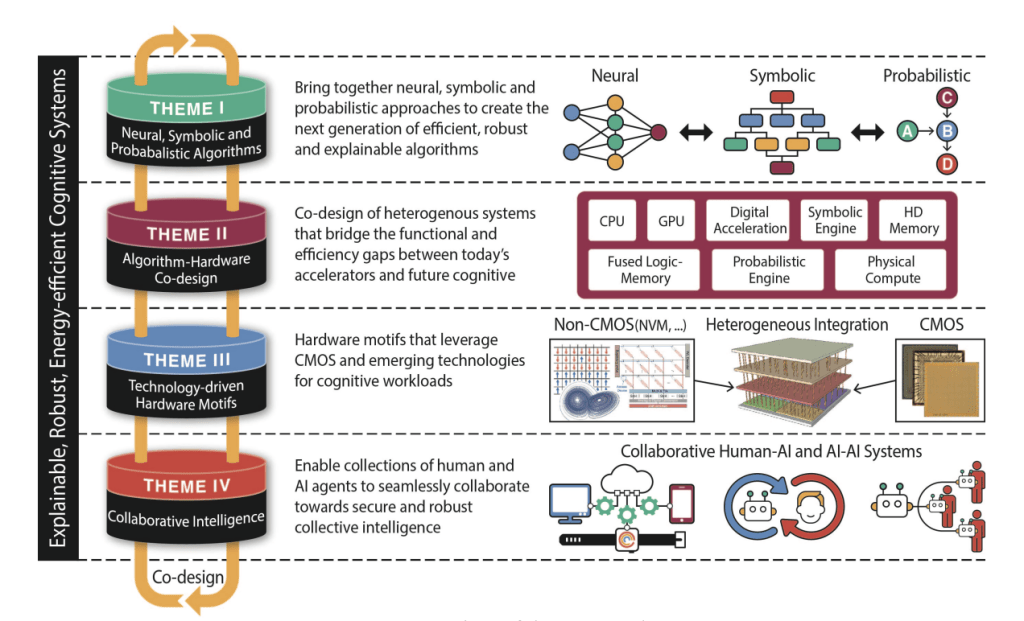
About
CoCoSys aims to enable the next-generation of collaborative human-AI systems through synergistic advances in algorithms, hardware motifs, algorithm-hardware co-design and collective and collaborative intelligence. The center will demonstrate the impact of these advances in collaborative human-AI applications such as co-bots, future digital assistants, and mixed-reality systems. These applications are characterized by the need for real-time responses, extreme energy efficiency, explainability, and trustworthiness and will thus serve as ideal drivers for the proposed research. The innovations delivered by COCOSYS will advance the brittle and limited capabilities of current AI systems to approach the vision of digital humans augmenting biological humans as a trusted collaborator.
To pursue the overarching vision and goals stated above, the center will adopt a vertically integrated approach consisting of synergistic efforts in neural, symbolic, and probabilistic algorithms; algorithm-hardware co-design; technology-driven hardware motifs; and collective and collaborative intelligence. Theme 1 (Neural, symbolic, and probabilistic algorithms) will create the next generation of explainable algorithms, expand the scope of neuroinspired algorithms from perception to reasoning and decision making, and uncover the fundamental accuracy-robustness-efficiency tradeoffs in cognitive systems. Theme 2 (Hardware algorithm co-design) will distill the key computational characteristics of future cognitive workloads developed by Theme 1 and use them to drive the design of the next generation of programmable hardware architectures for cognitive computing. This theme will play a key role in ensuring that the developed algorithms are well-matched to the proposed hardware fabrics and vice-versa. Theme 3 (Technology-driven hardware motifs) will design the building blocks of future cognitive hardware platforms by matching the unique capabilities of various CMOS and beyond-CMOS devices and integration technologies to the needs of the workloads, seeking quantum improvements in energy efficiency and performance. Theme 4 (Collaborative intelligence) will specifically focus on the challenges involved in collections of AI agents and how AI agents interact with humans.
The following ten universities have come together to pursue the goals of CoCoSys:









Research
The center’s research is organized into the following themes: (1) NEURAL, SYMBOLIC, AND PROBABILISTIC ALGORITHMS, (2) HARDWARE ALGORITHM CO-DESIGN, (3) TECHNOLOGY-DRIVEN HARDWARE MOTIFS, and (4) COLLABORATIVE INTELLIGENCE.
Click the theme title for more information about each theme and its researchers.

NEURAL, SYMBOLIC, AND PROBABILISTIC ALGORITHMS.
Theme 1 will create the next generation of explainable algorithms, expand the scope of neuro-inspired algorithms from perception to reasoning and decision-making, and uncover the fundamental accuracy-robustness-efficiency tradeoffs in cognitive systems. Theme 1 focuses on the following tasks:
- Unifying Neural, Symbolic, and Probabilistic Models
- Hyper-dimensional (HD) Information Representations & Processing
- Computing with Emergent and Dynamical Systems
- Theoretical Underpinnings of Robustness-accuracy-efficiency Tradeoffs
HARDWARE ALGORITHM CO-DESIGN
Theme 2 will distill the key computational characteristics of future cognitive workloads developed by Theme 1 and use them to drive the design of the next generation of programmable hardware architectures for cognitive computing. This theme will play a key role in ensuring that the developed algorithms are well-matched to the proposed hardware fabrics and vice-versa. Theme 2 focuses on the following tasks:
- Architectures for Neuro-symbolic-probabilistic Workloads
- Full-stack Optimization and Software Frameworks for Cognitive Systems
- Technology and Integration-driven Cognitive Architectures
- Computing with Emergent and Dynamical Systems
TECHNOLOGY-DRIVIN HARDWARE MOTIFS
Theme 3 will design the building blocks of future cognitive hardware platforms by matching the unique capabilities of various CMOS and beyond-CMOS devices and integration technologies to the needs of the workloads, seeking quantum improvements in energy efficiency and performance. Theme 3 focuses on the following tasks:
- Digital, Mixed-signal, and Mixed-mode Cognitive Circuits
- Technology (Logic, Memory, Interconnect) Evaluation
- Heterogeneous Integration-Driven Cognitive HW Design
- Hardware Prototyping and Benchmarking
COLLABORATIVE INTELLIGENCE
Theme 4 will specifically focus on the challenges involved in collections of AI agents and how AI agents interact with humans. Theme 4 focuses on the following tasks:
- Digital, Mixed-signal, and Mixed-mode Cognitive Circuits
- Technology (Logic, Memory, Interconnect) Evaluation
- Heterogeneous Integration-Driven Cognitive HW Design
- Hardware Prototyping and Benchmarking